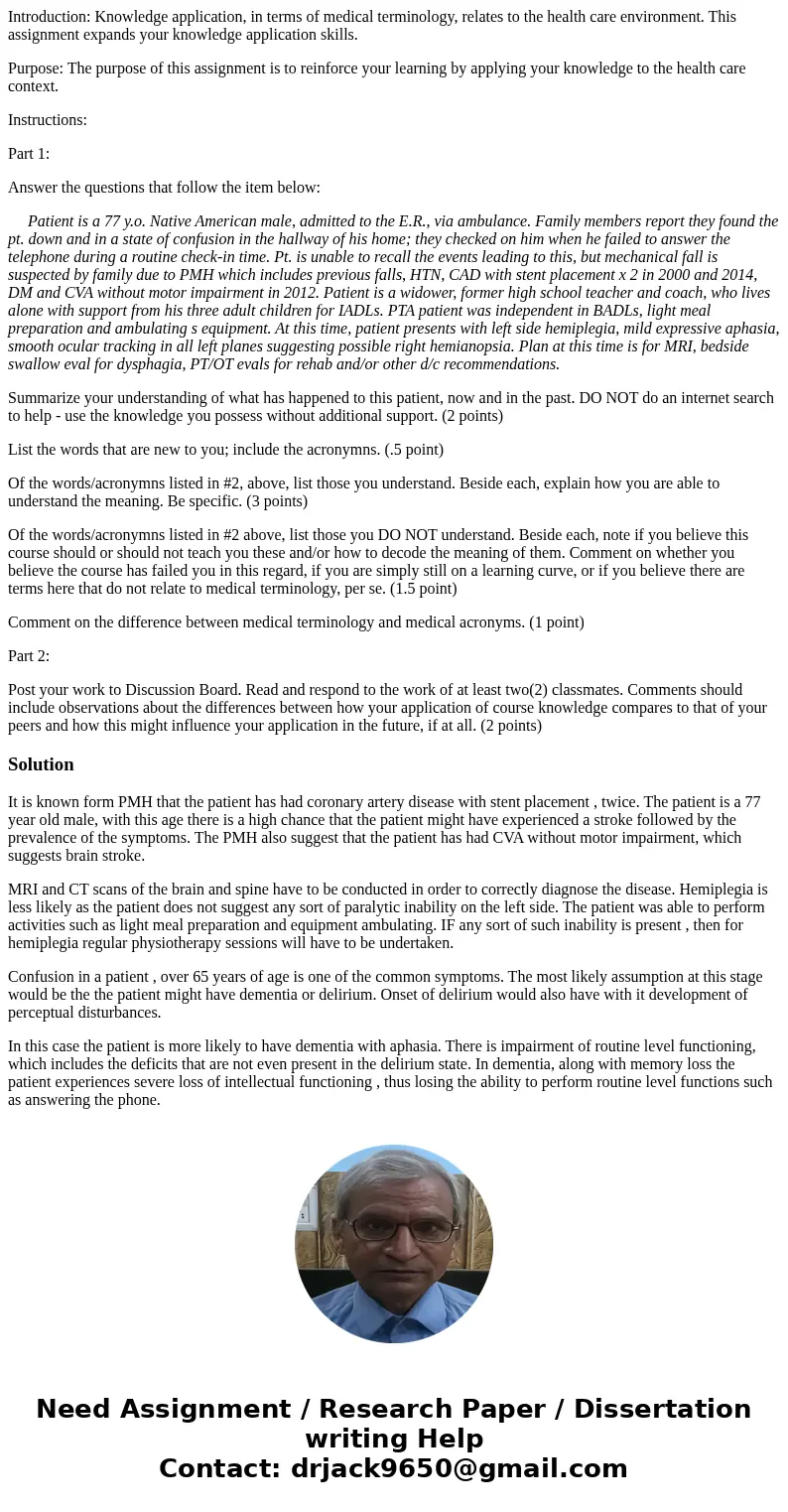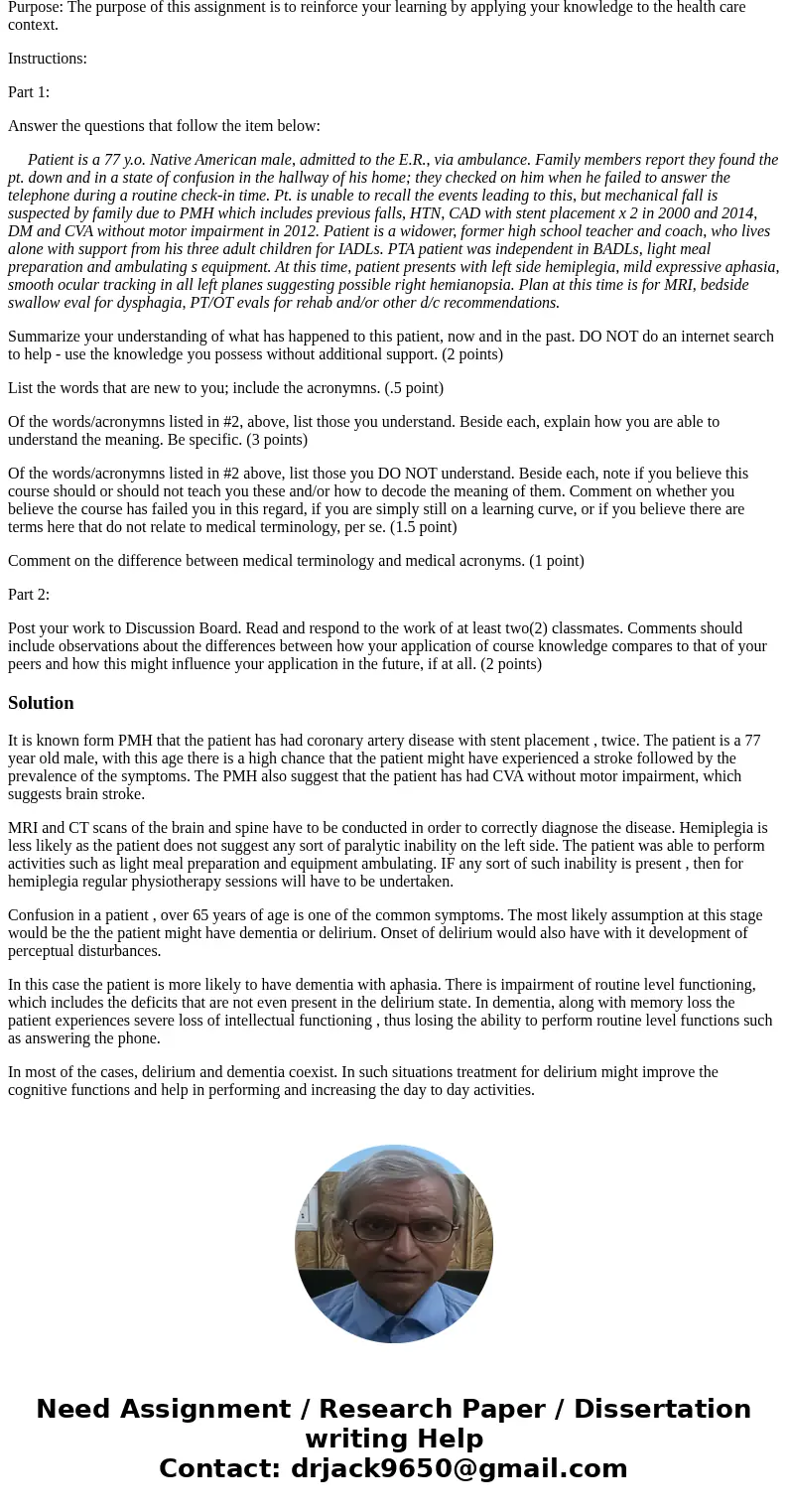Introduction Knowledge application in terms of medical termi
Introduction: Knowledge application, in terms of medical terminology, relates to the health care environment. This assignment expands your knowledge application skills.
Purpose: The purpose of this assignment is to reinforce your learning by applying your knowledge to the health care context.
Instructions:
Part 1:
Answer the questions that follow the item below:
Patient is a 77 y.o. Native American male, admitted to the E.R., via ambulance. Family members report they found the pt. down and in a state of confusion in the hallway of his home; they checked on him when he failed to answer the telephone during a routine check-in time. Pt. is unable to recall the events leading to this, but mechanical fall is suspected by family due to PMH which includes previous falls, HTN, CAD with stent placement x 2 in 2000 and 2014, DM and CVA without motor impairment in 2012. Patient is a widower, former high school teacher and coach, who lives alone with support from his three adult children for IADLs. PTA patient was independent in BADLs, light meal preparation and ambulating s equipment. At this time, patient presents with left side hemiplegia, mild expressive aphasia, smooth ocular tracking in all left planes suggesting possible right hemianopsia. Plan at this time is for MRI, bedside swallow eval for dysphagia, PT/OT evals for rehab and/or other d/c recommendations.
Summarize your understanding of what has happened to this patient, now and in the past. DO NOT do an internet search to help - use the knowledge you possess without additional support. (2 points)
List the words that are new to you; include the acronymns. (.5 point)
Of the words/acronymns listed in #2, above, list those you understand. Beside each, explain how you are able to understand the meaning. Be specific. (3 points)
Of the words/acronymns listed in #2 above, list those you DO NOT understand. Beside each, note if you believe this course should or should not teach you these and/or how to decode the meaning of them. Comment on whether you believe the course has failed you in this regard, if you are simply still on a learning curve, or if you believe there are terms here that do not relate to medical terminology, per se. (1.5 point)
Comment on the difference between medical terminology and medical acronyms. (1 point)
Part 2:
Post your work to Discussion Board. Read and respond to the work of at least two(2) classmates. Comments should include observations about the differences between how your application of course knowledge compares to that of your peers and how this might influence your application in the future, if at all. (2 points)
Solution
It is known form PMH that the patient has had coronary artery disease with stent placement , twice. The patient is a 77 year old male, with this age there is a high chance that the patient might have experienced a stroke followed by the prevalence of the symptoms. The PMH also suggest that the patient has had CVA without motor impairment, which suggests brain stroke.
MRI and CT scans of the brain and spine have to be conducted in order to correctly diagnose the disease. Hemiplegia is less likely as the patient does not suggest any sort of paralytic inability on the left side. The patient was able to perform activities such as light meal preparation and equipment ambulating. IF any sort of such inability is present , then for hemiplegia regular physiotherapy sessions will have to be undertaken.
Confusion in a patient , over 65 years of age is one of the common symptoms. The most likely assumption at this stage would be the the patient might have dementia or delirium. Onset of delirium would also have with it development of perceptual disturbances.
In this case the patient is more likely to have dementia with aphasia. There is impairment of routine level functioning, which includes the deficits that are not even present in the delirium state. In dementia, along with memory loss the patient experiences severe loss of intellectual functioning , thus losing the ability to perform routine level functions such as answering the phone.
In most of the cases, delirium and dementia coexist. In such situations treatment for delirium might improve the cognitive functions and help in performing and increasing the day to day activities.


 Homework Sourse
Homework Sourse